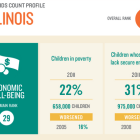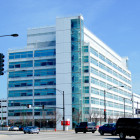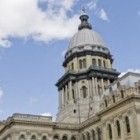
Illinois’ Youth Well-Being Ranks Near Middle in New National Report
|
Illinois is ranked 23rd overall for child well-being in the Annie E. Casey Foundation’s 2013 KIDS COUNT Data Book.
Juvenile Justice Information Exchange (https://jjie.org/tag/chicago-project/page/2/)

Illinois is ranked 23rd overall for child well-being in the Annie E. Casey Foundation’s 2013 KIDS COUNT Data Book.

Recidivism rates at Illinois detention centers are projected be above 40% in 2013.

Much of today’s jail and prison population is young people arrested on drug offenses, many so heavily into narcotics that they are considered mentally ill.

UPDATE: The Illinois House approved has signed off on a bill that would place more 17-year-olds in the state’s juvenile courts – steering more youth away from the adult system. As it is in Illinois, youth under 17 that are, in most cases, charged with felonies are tried as adults. Under the bill, which now goes to the Senate after an 89-26 House vote, 17-year-olds charged with “lesser felonies” would have their cases heard in juvenile courts. Offenders 17-year-old and younger charged with more serious offenses – among them murder, aggravated sexual assault and armed robbery – would still face an automatic transfer to adult court. The idea behind the bill mirrors a national trend toward easing punishment and consequences for juveniles and greater emphasis on rehabilitation with nod to science and court rulings that minors’ brains have not matured to a level that they should face adult sanctions for crimes committed while still young.
This story was produced by The Chicago Bureau
(UPDATE: Thursday marked a new development in the effort to provide the United States with comprehensive gun control reformwhen the Senate voted 68-31 to debate on President Barack Obama’s proposed measures to heighten gun control and reduce gun violence.)
First Lady Michelle Obama visited her hometown of Chicago Wednesday and made an emotional plea for providing the city’s youth with opportunities in order to curb violence in their neighborhoods. (Watch the video here.)
At the Wednesday luncheon of business executives and community leaders held at The Hilton Chicago, she stated while all the city’s youth had enormous amounts of potential, a home address and the distance of a few blocks could determine the life chances and opportunities offered to children, thus changing their futures. Besides exposing business and community leaders to the issue of gun violence, the Wednesday luncheon also spotlighted Mayor Rahm Emanuel’s new Chicago Public Safety Action Community Fund, a city initiative introduced in February that will allocate $50 million to providing more community resources to at-risk youth to steer them away from violence. The initiative has already raised $33 million. Michelle Obama’s remarks came two days after President Barack Obama traveled to the University of Hartford, where he urged Congress to pass legislation that would tackle the issue of gun violence in the U.S.
In January, issued nearly two dozen executive orders and presented proposals for consideration by Congress to reduce gun violence. Some of these proposals included expanding background checks for gun purchases, increasing mental health resources and creating a more effective ban on assault weapons.
This story was produced by The Chicago Bureau
A lot of political, medical and legal chatter is firing around the tricky issue of decriminalizing the possession of marijuana, regulating its sale or maintaining the status quo. From Washington state, where it’s now legal to use, to Denver where they’re debating putting the drug on par with alcohol regulations, to Washington, D.C., where federal legislation to do something – anything – to create a nationwide approach or guide, it seems all are weighing in. Take doctors: Some say it’s unhealthy – addictive, even deadly; other physicians say it saves lives or at least makes the dying or suffering get through pain. But despite a federal hard line against the drug, results from a recent poll show that the American public approves marijuana legalization 51 vs. 44 percent.
From the Chicago Bureau: Early Monday in Washington, the United States Supreme Court agreed to take up several cases ranging from liability in cases of generic drug makers and the freezing of defendant assets ahead of a case going to trial. At the same time, they shut down an appeal by financial giant Goldman Sachs Group, which according to the high court will have to answer investors in court about spiraling mortgage securities during the near-crippling financial crisis. Rewind 50 years, and a far different court in a far different time — economically, socially and legally — handed down one of the sentinel decisions in American criminal law: Gideon v. Wainwright. At the end of that day, March 18, 1963, a poor man named Clarence Earl Gideon — who was accused of attempt to commit petty larceny after a break-in and theft at aFlorida poolroom bar nearly two years earlier — had won the right to be represented by an attorney in court. It was a ruling based on the Constitution’s Sixth and Fourteenth amendments. A poor man had won in a rich country torn by race, income equity and on nearly every social and economic front, opening previously shut legal doors to the country’s most down-and-out citizens by guaranteeing the right to counsel in criminal cases.
Reporters are shown a funeral program for Hadiya Pendleton’s services/Photo by Safiya Merchant
This story is from the Chicago Bureau
IN BRIEF: The U.S. Senate Judiciary Committee has sent to the full body a gun control bill aimed at so-called straw buyers and that, in part, is named for slain Chicago teen Hadiya Pendleton. Hadiya, who was part of a presidential inaugural show this year, was slain on Chicago’s South Side shortly after returning home, and just a short distance from President Barack Obama’s home here. Her death helped marshal the anti-gun push that gained much traction after the December Connecticut school massacre. The committee, headed by chief sponsor Patrick Leahy of Vermont, voted 11-7 to OK the bill. It was co-sponsored by senior Illinois Senator Dick Durbin and junior Senator Mark Kirk and got the nod from a single Republican on the panel, Iowa’s Chuck Grassley.
Gov. Pat Quinn announced a doubling of anti-violence program in his budget address/Photo by Gage Skidmore
Written by James Swift and Eric Ferkenhoff
During his Fiscal Year 2014 Budget Address - in which Gov. Pat Quinn announced sharp cuts to education that worried many teachers and youth workers – there was a bit of good news on the juvenile front. Quinn, battling massive pension problems and a fiscal situation that can’t seem to stop bleeding, looks to boost funding for the anti-violence and youth-engagement program Redeploy Illinois. The program, which is statewide under the Bureau of Youth Intervention Services, is expected to see its coffers swell, more than doubling to $4.9 million for the new fiscal year that begins July 1. The budget proposal still faces the legislative back-and-forth. But according to literature on the Redeploy, it is designed as a youth deterrent targeted at those “between the ages of 13 and 18 who are at high risk of being committed to the Department of Corrections.”
It comes at a time of high crime in Chicago and Cook County, which has generated much national and even international attention – even bringing President Obama to town to discuss the violence in his hometown.
Originally appeared in The Chicago Bureau
Miguel Rodriguez, director of the Graffiti Zone, sitting outside the program’s home/Photo by Samantha Caiola
In a two-story brick residence in Humboldt Park, three teen artists sit around a table discussing their plans for an original neighborhood mixtape. There’s a tripod and a can of spray paint on the table, as well as a pile of paperwork, including grant proposals. The walls are covered in painted portraits. When these three turn 18, they’ll have the opportunity to live in this house as part of Graffiti Zone’s Artist-in-Residence program, which pays young artists a weekly stipend to hone their passions and, they hope, beautify a neighborhood too often making headlines for its violence. The teens – currently ages 16 to 17 – were commissioned to the house by Miguel Rodriguez, who at 20 is the director of Graffiti Zone, a Chicago nonprofit that helps at-risk teens express their talents.